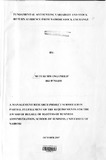| dc.description.abstract | Every investor would like to feel that he/she has obtained the best deal for his investment; in his buy decision he would like to feel that he has not paid more than the investment is worth, while in the sell decision he would wish to be assured that he has not sold his investment for less. This can only be possible if there is an appropriate asset pricing model.
Valuation of financial assets is therefore at the core of finance both in academia and practice. The Capital Asset Pricing Model has been one of the most dominant asset pricing concepts. However the assumptions that underpin this model have been challenged by a number of studies which found other variables/factors that explained stock returns better than beta. These studies have been conducted in both developed and emerging markets.
This research sought to find out the factors that explain stock return at the Nairobi Stock Exchange in view of the findings of past studies that there exists factors that outperform beta in explaining the stock returns. The study examined empirically the relationship between fundamental accounting variables and common stock returns at the Nairobi Stock Exchange for the period 2000 to 2007. It examined the explanatory (predictive) power of five fundamental accounting variables: Market Value of Equity (MVE), Book to Market Value of equity (BTM), Debt to Equity ratio (DER), Cash Flow from Operation to Size (CFO/MVE) and Dividend Yield (DY). It applied Univariate portfolio analysis and the Fama and Macbeth (1973) regressions to test this predictive power.
Findings from the study show that Market Value of Equity, Book to Market Value of Equity, Debt to Equity ratio and Dividend Yield possess significant explanatory power of common stock returns. Of the four variables Dividend Yield possess the highest explanatory power. The study did not find any significant explanatory power of Cash Flow from Operations to Size ratio.
This led to the conclusion that stock of small firms provide greater returns than those of large firms and that investors at the Nairobi Stock Exchange consider firms with more debt as riskier than firms with low debt and therefore require additional return to compensate for this additional risk. The study found the results consistent with a number of past studies in both developed and emerging markets. | en |

